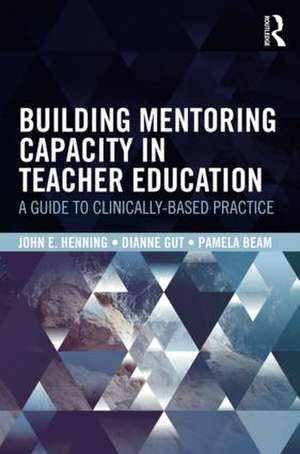Building Mentoring Capacity in Teacher Education: A Guide to Clinically-Based Practice
Autor John E. Henning, Dianne M. Gut, Pamela C. Beamen Limba Engleză Paperback – 8 aug 2018
| Toate formatele și edițiile | Preț | Express |
|---|---|---|
| Paperback (1) | 371.10 lei 6-8 săpt. | |
| Taylor & Francis – 8 aug 2018 | 371.10 lei 6-8 săpt. | |
| Hardback (1) | 1109.18 lei 6-8 săpt. | |
| Taylor & Francis – 8 aug 2018 | 1109.18 lei 6-8 săpt. |
Preț: 371.10 lei
Nou
Puncte Express: 557
Preț estimativ în valută:
71.02€ • 73.87$ • 58.63£
71.02€ • 73.87$ • 58.63£
Carte tipărită la comandă
Livrare economică 14-28 aprilie
Preluare comenzi: 021 569.72.76
Specificații
ISBN-13: 9780815366034
ISBN-10: 0815366035
Pagini: 250
Ilustrații: 21 Tables, black and white; 2 Illustrations, black and white
Dimensiuni: 152 x 229 x 27 mm
Greutate: 0.34 kg
Ediția:1
Editura: Taylor & Francis
Colecția Routledge
Locul publicării:Oxford, United Kingdom
ISBN-10: 0815366035
Pagini: 250
Ilustrații: 21 Tables, black and white; 2 Illustrations, black and white
Dimensiuni: 152 x 229 x 27 mm
Greutate: 0.34 kg
Ediția:1
Editura: Taylor & Francis
Colecția Routledge
Locul publicării:Oxford, United Kingdom
Public țintă
Academic, Postgraduate, Professional Practice & Development, and UndergraduateCuprins
List of Tools List of Figures Preface Acknowledgements Definition of Terms Part I: Mentoring for Clinically-Based Teacher Education 1. Teacher Development 1.1 Introduction 1.2 The Role of Mentoring 1.3 Mentoring to Promote Teacher Development in Clinical Settings 1.4 Teacher Development in Context 1.5 Fostering Development in Context 1.6 The Development of Practice Towards Complexity 1.7 Fostering Development in Towards Complexity 1.8 The Development of Teacher Thinking 1.9 Fostering Development in Thinking 1.10 Organization of Chapters 1.11 Summary 1.12 Activity 2. Establishing the Mentoring Relationship 2.1 Introduction 2.3 Selecting the Mentor 2.4 Matching the Mentor and Mentee 2.5 Interview 2.6 Orienting the Teacher Candidate 2.7 The Teacher Candidate Questionnaire 2.8 Mismatch 2.9 Summary 2.10 Activities 3. Engaging Teacher Candidates 3.1 Introduction 3.2 Teacher Development 3.3 High Leverage Teaching Practices 3.4 The Developmental Curriculum for Clinical Experiences 3.5 Benefits of the Developmental Curriculum for Clinical Experiences 3.6 The Interactions Matrix 3.7 High Leverage Teaching Tasks 3.8 Summary 3.9 Activities 4. Co-Teaching 4.1 Introduction 4.2 Co-Teaching Benefits 4.3 Teacher Candidate Development through Co-Teaching 4.4 A Case Study of Co-teaching 4.5 Conceptual Framework for Co-Teaching 4.6 Summary 4.7 Activities 5. Coaching 5.1 Introduction 5.2 Teacher Development 5.3 Coaching Opportunities 5.4 Beyond Questions 5.5 The Language of Coaching 5.6 Coaching Dispositions 5.7 Modeling: Mentors Talk about Their Teaching 5.8 Summary 5.9 Activities 6. Reflection 6.1 Introduction 6.2 Teacher Development 6.3 Two Types of Reflection: Reflection-in-Action and Reflection-on-Action 6.4 Facilitating Reflection through Systematic Thinking: The DIJS Model 6.5 Fostering Critical Reflection 6.6 Summary 6.7 Activities Part II: Building a Mentoring Culture 7. Initial Phase of Clinical Experience 7.1 Introduction 7.2 Teacher Development 7.3 Engagement 7.4 Co-Teaching 7.5 Coaching 7.6 Reflection 7.7 Summary 7.8 Activities 8. Intermediate Phase of Clinical Experience 8.1 Introduction 8.2 Teacher Development 8.3 Engagement 8.4 Co-Teaching 8.5 Coaching 8.6 Reflection 8.7 Summary 8.8 Activities 9. Continuous Phase of Clinical Experience 9.1 Introduction 9.2 Teacher Development 9.3 Engagement 9.4 Co-Teaching 9.5 Coaching 9.6 Reflection 9.7 Summary 9.8 Activities 10. Early Career Teachers 10.1 Introduction 10.2 Teacher Development 10.3 Engagement 10.4 Co-Teaching 10.5 Coaching 10.6 Reflection 10.7 Summary 10.8 Activities 11. Teacher Leaders 11.1 Introduction 11.2 Teacher Development 11.3 Engagement 11.4 Co-Teaching 11.5 Coaching 11.6 Reflection 11.7 Summary 11.8 Activities 12. Building a Mentoring Culture 12.1 Introduction 12.2 Challenges 12.3 Develop Your Vision 12.4 Building a Mentoring Culture 12.5 Summary 12.6 Activities References Appendix: High Leverage Teaching Tasks Index
Notă biografică
John E. Henning is Professor and Dean of the School of Education at Monmouth University
Dianne M. Gut is Professor of Teacher Education at Ohio University
Pam C. Beam is Lecturer of Teacher Education at Ohio University
Dianne M. Gut is Professor of Teacher Education at Ohio University
Pam C. Beam is Lecturer of Teacher Education at Ohio University
Descriere
Veteran teacher educators outline a developmental approach for supporting mentees as they grow in their careers. Part I outlines key components of the mentoring process and Part II demonstrates how those strategies can support mentees at different stages. Included throughout are case studies, activities, and discussion questions.
